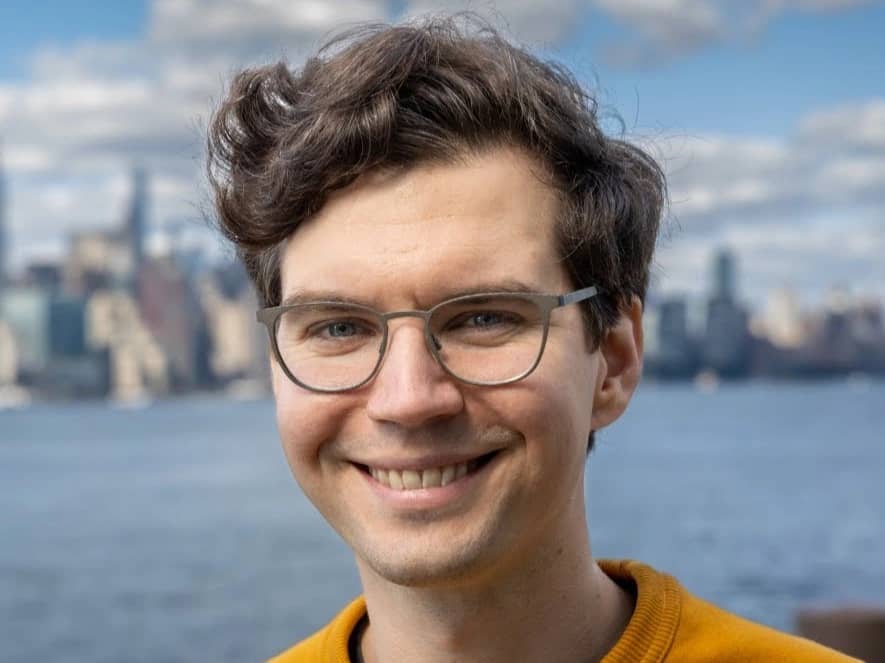위키 구독하기
Share wiki
Bookmark
Austin Federa
0%
Austin Federa
**오스틴 페더라(Austin Federa)**는 탈중앙화된 물리적 인프라(DePIN) 프로젝트인 DoubleZero의 공동 창립자입니다. 이전에는 솔라나 재단의 전략 책임자로 재단의 전략적 노력을 이끌고 솔라나 생태계의 발전을 지원했습니다. 그는 솔라나 랩스, 바이슨 트레일스(코인베이스에 인수됨), 리퍼블릭 크립토 등에서 블록체인, 제품 마케팅, 커뮤니케이션 분야에서 다양한 역할을 수행했습니다.[5][1]
교육
페더라는 로렌스 대학교에서 정치학, 환경 과학, 경제학을 전공하여 2013년에 학사 학위를 받았습니다. 또한 2010년부터 2011년까지 사라 로렌스 칼리지에서 1년 동안 수학했습니다.[1][6]
경력
오스틴 페더라는 디지털 콘텐츠 및 커뮤니케이션 분야에서 경력을 시작했습니다. 초기 경력으로는 NPR 회원 방송국인 KBIA 91.3 FM에서 디지털 콘텐츠 디렉터로 근무하며 방송국의 웹사이트 및 디지털 전략을 담당했습니다. 이후 Superpedestrian으로 이직하여 소셜/디지털 및 커뮤니티 매니저로 소셜 미디어 활동 및 디지털 마케팅 프로젝트를 감독했습니다.[6]
2015년에는 The Boston Globe에서 소셜 미디어 에디터로 콘텐츠 배포를 관리했습니다. 2018년에는 리퍼블릭의 마케팅 디렉터로 합류하여 블록체인 분야로 전환하여 리퍼블릭의 암호화폐 플랫폼 마케팅 전략 개발에 참여했습니다.
2020년에는 블록체인 인프라 제공업체인 바이슨 트레일스에서 선임 제품 마케팅 매니저 역할을 맡았습니다. 바이슨 트레일스가 코인베이스에 인수된 후 2021년 솔라나 랩스에 커뮤니케이션 책임자로 합류했습니다. 2022년 말에는 솔라나 재단으로 옮겨 전략 책임자가 되었습니다. 페더라는 2024년 12월 DoubleZero를 공동 창립하기 위해 떠날 때까지 생태계에서 저명한 인물로 활동했습니다.[5][1]
페더라는 경력 전반에 걸쳐 블록체인의 다양한 측면에 관여하여 탈중앙화 기술의 개발 및 커뮤니케이션에 기여했습니다.[3][4]
DoubleZero
2024년 12월, 페더라는 솔라나 재단을 떠나 마테오 워드(Mateo Ward) 및 앤드류 맥코넬(Andrew McConnell)과 함께 DoubleZero를 공동 창립한다고 발표했습니다. 이 회사는 블록체인을 위한 고성능 네트워크 레이어를 구축하는 데 중점을 둔 탈중앙화된 물리적 인프라(DePIN) 프로젝트로, "암호화폐 버전의 플래시 보이즈(Flash Boys)"로 묘사되었습니다. 2025년 3월까지 이 프로젝트는 암호화폐 VC로부터 4억 달러의 가치를 인정받은 것으로 알려졌습니다. 메인넷과 네이티브 토큰은 2025년 하반기에 출시되었습니다.[5][7][8]
기술 및 아키텍처
DoubleZero는 중요한 트랜잭션 데이터가 일반 웹 트래픽과 경쟁하여 처리량이 많은 블록체인의 속도를 제한하는 공용 인터넷으로 인한 병목 현상을 해결합니다. 이 프로젝트의 프로토콜을 통해 여러 독립적인 엔터티가 사용되지 않는 "다크 파이버"를 포함한 자체 사설 광섬유 네트워크를 제공하여 단일의 탈중앙화된 고성능 메시 네트워크를 구축할 수 있습니다. 이를 통해 블록체인은 노드 수를 줄여 중앙 집중화 없이 확장하고 속도를 높일 수 있습니다.[7][6][5]
인프라는 속도와 보안을 모두 제공하도록 설계된 "2중 링 아키텍처"를 기반으로 합니다. "방어 링(Defense Ring)"은 FPGA와 같은 공유 하드웨어를 활용하여 유효성 검사기가 스팸 및 유효하지 않은 트랜잭션 데이터에 도달하기 전에 보호하는 "공통 방패" 역할을 합니다. "네트워킹 링(Networking Ring)"은 전용 광섬유 연결을 활용하여 블록 전파 및 노드 간 통신을 가속화합니다. 공용 인터넷은 검열 저항 및 가동 시간을 보장하기 위한 대체 경로 역할을 합니다.[8][7][5]
DoubleZero는 솔라나와 같은 블록체인에 직접 구축되는 대신 페더라가 "회계 데이터베이스"라고 설명한 자체 원장 시스템을 갖춘 별도의 프로토콜로 운영됩니다. 네트워크 규칙을 시행하기 위해 보상과 지분 증명(PoS) 삭감 메커니즘을 갖춘 인센티브 모델을 사용합니다.[7][5]
목표 및 채택
DoubleZero의 초기 초점은 높은 트랜잭션 처리량과 그에 따른 더 빠른 통신 레이어의 필요성 때문에 선택된 솔라나 블록체인이었습니다. 2025년 8월까지 테스트넷은 프로젝트에서 시작한 3백만 SOL 스테이크 풀에 의해 부분적으로 보조금을 받아 스테이킹된 모든 SOL의 약 12.5%를 지원하고 있었습니다. 회사의 장기적인 목표는 솔라나 네트워크가 초당 100,000~100만 건의 트랜잭션(TPS)을 유지할 수 있도록 하는 것입니다. 솔라나 외에도 인프라는 콘텐츠 전송 네트워크(CDN), 게임 및 대규모 언어 모델(LLM)과 같이 고성능 데이터 전송이 필요한 다른 사용 사례를 지원하도록 설계되었습니다.[7][8][5]
인터뷰
오스틴 페더라와 함께하는 암호화폐 시장 인사이트 #01
2024년 3월 20일, 오스틴 페더라는 CNBC Television에 출연하여 암호화폐 시장의 현재 역학에 대한 자신의 견해를 공유했습니다. 대화 중에 페더라는 유틸리티, 개발자 참여 및 알트코인의 진화하는 역할에 초점을 맞춰 업계를 형성하는 몇 가지 주요 개발 사항을 강조했습니다.
페더라에 따르면 비트코인과 이더리움이 시장 랠리를 계속 주도함에 따라 알트코인에 대한 관심이 높아지고 있습니다. 그는 블록체인 기능의 차별화가 더 많은 개발자가 새로운 기회를 탐색하고 다양한 플랫폼에서 애플리케이션을 구축하도록 유도하고 있다고 강조했습니다. 이러한 증가하는 관심은 확장되는 사용 사례와 생태계 내에서 보다 발전된 기술 솔루션의 필요성을 반영합니다.
논의된 중요한 포인트 중 하나는 레이어 2(L2) 솔루션의 부상입니다. 페더라의 견해에 따르면 이러한 솔루션은 탈중앙화 애플리케이션의 확장성과 성능을 개선하는 데 중요한 역할을 합니다. 트랜잭션 효율성을 향상시킴으로써 L2는 소비자 대면 애플리케이션이 번성하는 것을 더 실현 가능하게 만들고, 이는 결국 더 광범위한 채택을 가속화합니다.
페더라는 또한 NFT 공간에서 선두를 달리고 있는 Drip House와 같은 혁신적인 프로젝트를 지적했습니다. 이러한 프로젝트는 아티스트 발굴 및 콘텐츠 제작에 중점을 두어 블록체인 기술이 참여 및 창의적인 수익 창출을 위한 새로운 모델을 만들 수 있는 잠재력을 보여줍니다.
또 다른 핵심 주제는 이더리움의 최근 업그레이드로, 트랜잭션 수수료를 크게 줄였습니다. 페더라는 이러한 감소가 개발자와 사용자 모두에게 이익이 되어 비용 장벽을 낮추고 탈중앙화 애플리케이션에 대한 접근성을 높인다고 설명했습니다.
그는 또한 솔라나의 고유한 접근 방식을 강조하면서 네트워크의 단일 글로벌 상태가 다른 블록체인에서 발견되는 파편화된 생태계와 대조적으로 애플리케이션 간의 신뢰와 효율성을 향상시킨다고 언급했습니다. 페더라에 따르면 이러한 설계는 보다 통합되고 원활한 사용자 경험을 가능하게 합니다.
마지막으로 인터뷰에서는 솔라나 생태계에 대한 벤처 캐피털의 새로운 관심에 대해 언급했습니다. 페더라는 많은 투자자들이 솔라나 내에서 기회를 적극적으로 모색하고 있으며, 이는 네트워크의 잠재력에 대한 자신감이 커지고 시장 회복에 대한 더 광범위한 낙관론을 반영한다고 관찰했습니다.[2]
솔라나 테제
2024년 4월 8일 Kryptoplanet[Official] YouTube 채널에 게시된 인터뷰에서 솔라나 재단의 전략 책임자인 오스틴 페더라는 BUIDL Asia 2024에서 강연하는 동안 "솔라나 테제"에 대해 논의했습니다. 페더라에 따르면 솔라나의 비전은 애플리케이션 간의 향상된 상호 운용성 및 확장성을 가능하게 하는 단일 글로벌 상태 머신을 만드는 핵심 아이디어를 통해 고성능 탈중앙화 블록체인으로 자리매김하는 데 중점을 두고 있습니다.
페더라는 빠른 완결성과 낮은 트랜잭션 수수료가 DeFi 및 NFT와 같은 영역에서 사용자 경험에 매우 중요하다고 설명했습니다. 네트워크 아키텍처를 최적화하고 고급 하드웨어를 활용함으로써 솔라나는 낮은 트랜잭션 비용을 유지하며, 이는 더 광범위한 채택을 촉진하는 데 중요하다고 그는 말했습니다.
그는 또한 개발 프로세스를 단순화하는 프로그램 재사용성 개념을 강조하여 개발자가 오버헤드를 줄여 애플리케이션을 배포할 수 있도록 했습니다. 이러한 접근 방식은 비용을 절감할 뿐만 아니라 프로젝트 출시 속도를 가속화한다고 그는 말했습니다.
페더라는 또한 솔라나가 하드웨어 발전과 함께 성장할 수 있는 능력을 언급하면서 기술이 발전함에 따라 네트워크가 더 많은 트랜잭션을 처리하여 비용을 낮추고 접근성을 향상시킬 수 있도록 보장했습니다.
또한 개발자 선택 사항이 초점이 되었으며, 페더라는 솔라나의 프로그래밍 언어 및 도구의 유연성이 개발자에게 프로젝트에 가장 적합한 옵션을 선택할 수 있는 자유를 제공하여 혁신을 주도한다고 강조했습니다.
그는 또한 탈중앙화 네트워크 내에서 허가된 시스템을 만들 수 있는 토큰 확장 프레임워크에 대해 논의했는데, 이는 기존 금융 플레이어를 블록체인 공간으로 끌어들일 수 있다고 믿는 기능입니다.
마지막으로 페더라는 여러 애플리케이션이 실시간으로 원활하게 상호 작용할 수 있도록 보장하여 트랜잭션 실패 위험을 줄이고 복잡한 작업에 대한 네트워크 안정성에 대한 신뢰를 높이는 원자적 구성 가능성을 강조했습니다.[[https://www.youtube.com/watch?v=uvofiBqyurc]\[\[BUIDL Asia 2024] The Solana Thesis by Austin Federa]]
잘못된 내용이 있나요?
